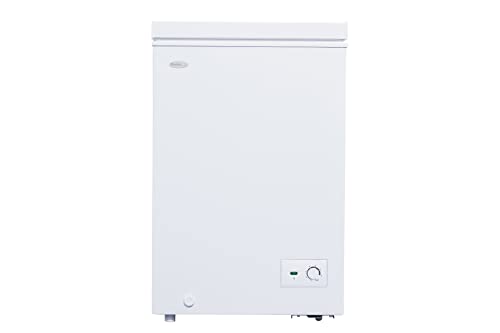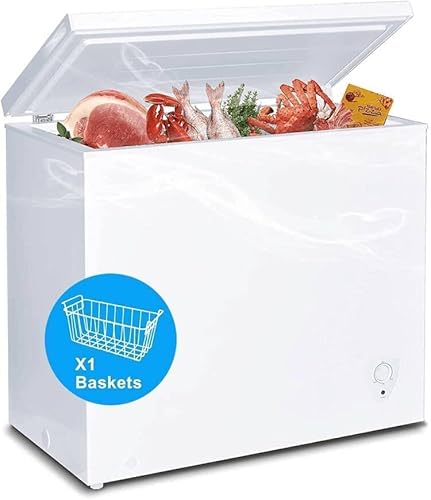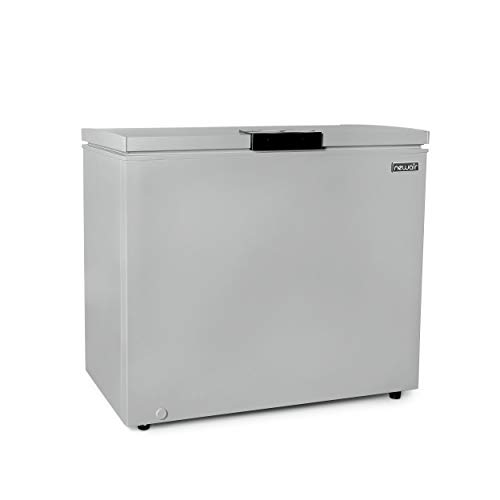18 Best Chest Freezer For Garage We've Tested 2024
Brandon Forder Apr 26, 2024 6:54 PM
Frozen food can be safely stored in standard freezers. But what do you do when your freezer is already completely full? Purchasing a chest freezer may be worthwhile.
A chest freezer, in contrast to more conventional types, has a door that swings out from the top. You can get an extra 20 percent capacity out of a freezer of this type.
Since it's unlikely that you have room for yet another freezer in your kitchen, a chest freezer is best kept in the garage. Most chest freezers can withstand temperatures as low as 0 degrees Fahrenheit, so there's no need to worry.
Consequently, you may relax knowing that the 5 freezers we've chosen for this list can withstand the elements in a typical garage.
The user handbook should be double-checked if you chance to reside in an extremely cold area where temperatures regularly drop below 0 degrees Fahrenheit.
To help you narrow down your options, this post will discuss the top chest freezers for the garage, including detailed analyses of their advantages and disadvantages.

Compare Products
- SCORE9.2
- BrandMidea
- Prime
- SCORE9.2
- BrandMidea
- Prime
- SCORE8.4
- BrandArctic King 7.0 cu ft Chest Freezer
- SCORE8.4
- BrandArctic King 7.0 cu ft Chest Freezer
- SCORE8.2
- BrandFRIGIDAIRE
- Prime
Last update on 2024-04-26 / Affiliate links / Images, Product Titles, and Product Highlights from Amazon Product Advertising API
Size
Chest freezers have a bigger footprint than standard refrigerators since they are opened from the top. What you intend to store in the freezer, as well as its intended location, will determine the ideal size for your needs. Bear in mind that the interior capacity will likely be more than that of your standard freezer, so you may only want a fraction of the space you anticipate.
You may need a larger freezer if you're a hunter who intends to freeze your game. Less space may be sufficient if you're only planning on freezing individual parts of meals rather than complete dishes.
Location
You shouldn't put a chest freezer in a tight spot, like up against a wall or in a corner, says Finazzo. "You want some breathing room, especially where the intake is where the compressor lives."
Although chest freezers are usually relegated to a forgotten corner of the basement or garage, it is crucial to examine the temperature range of the location. Not all freezers are designed to withstand the high temperatures that can be found in, say, a garage. Choose a freezer that can withstand higher temperatures (such as those found in a garage) if you intend to keep it there.
Organization
Unorganized bags and containers can quickly multiply in a chest freezer. To keep things organized, Finazzo suggests labeling anything you store in the freezer and making use of the supplied baskets.
Avoid placing warm items, such as leftovers, inside your chest freezer, as advised by Finazzo. "If, say, you're making soup and you want to freeze it, you're better off putting it into your refrigerator for a couple of hours, then transferring it to the freezer." one expert advises. Condensation forms when you put warm items in the freezer, and the temperature of the surrounding foods is altered, both of which can have an adverse effect on their quality.
Finazzo suggests putting blueberries and other foods that need to be kept at room temperature on a tray and providing as much ventilation as possible around them. Then, once they are completely frozen, place them in a bag or container. If you want to keep your blueberries (or anything else you're freezing) from turning into a solid block in the freezer, do it this way.
Capacity
The capacity of a chest freezer is determined by its storage capacity, which can be anywhere from 3 to 22 cubic feet. The average chest freezer has a capacity of 112 gallons of liquid, or 15 cubic feet of storage space. When looking for a replacement, remember that a higher capacity implies the unit will be bulkier and require more space in your driveway or basement. Finding a happy medium between living space and storage space could be crucial.
Manual vs. Automatic Defrosting
When ice and frost build up within your chest freezer, you'll need to defrost it manually. Unplug your model, remove all of its components, then chisel away at the ice and frost after it reaches a thickness of a quarter of an inch. Once the ice and frost have gone, you can unplug the appliance, drain the water, and then reconnect it.
In a chest freezer that defrosts on its own, the interior coils will heat up on occasion to prevent frost buildup. The setup and ongoing costs for this choice are higher, but its convenience makes up for it.
Safety Lock
If your chest freezer includes a safety lock, the food within is protected from unauthorized access. Having this option is especially helpful if you routinely host parties or intend on putting your freezer in a garage. When the appliance is locked, it prevents anyone from getting inside it without your permission. The safety lock will likely come with a separate key or fob that you should keep somewhere secure but easily accessible.
Garage-Ready Design
If you need more storage space but don't have room in your kitchen, a chest freezer built for the garage is the way to go. In either extremely hot or extremely cold climates, the appliance will continue to function as intended thanks to this type of construction. That is to say, your items will be protected from deterioration and will maintain a constant temperature and humidity inside the container. You should look for a freezer that can be placed in a garage, as not all of them can.
Temperature alarm
An audible warning can be heard from some freezers if the door is left open or if the temperature inside rises too high. There aren't many homes with this added bonus, but it's worth considering.
Precise temperature control
Freezers are typically kept at 0 degrees Fahrenheit. The FDA says that doing this will keep food safe to consume forever and preserve its flavor and appearance for months. There aren't many situations in which you'd want to change that target temperature, but if your freezer isn't calibrated properly, you could find that external temperature controls that let you choose precise values are useful.
Leveling legs or optional casters
A machine with leveling legs can be used on any surface without worrying about tipping over. The freezer's wheels are detachable, making it simple to transport when necessary.
Garage readiness
This implies that the freezer can withstand the extremes of temperature found in a garage, from the deep freeze of winter to the blistering heat of summer. The majority of chest freezers, including the ones we suggest, can be stored in a garage.
How long does a chest freezer last?
The typical lifespan of a chest freezer is 14 years. A regular refrigerator only lasts about ten years, so this is a significant improvement. If you take care of your freezer and keep it in the right conditions, it will last longer. If your freezer isn't built to withstand the elements in a garage, for instance, it would be best stored in a kitchen or climate-controlled basement. Check for ice buildup and remove it by hand if necessary. In addition, after using the appliance, always replace the lid securely to prevent extra stress on the motor.
How do I organize a chest freezer?
Use the baskets or dividers provided to keep your chest freezer neat and tidy. Collect like objects and place them in their own basket. You can get to the things you need quickly if you stack baskets and bins. In addition, put the oldest meats, fruits, and vegetables on top so you may utilize them first and label them with a "best by" date.
Are chest freezers dangerous?
It's important to keep a few things in mind when searching for a chest freezer because they might pose a threat in the wrong hands. People who live near the shore should know that the salty air can accelerate the corrosion of outdoor chest freezers, and that having a lockable chest freezer can prevent any "Hide and Go Seek" disasters. It's possible that an indoor freezer chest would be the finest choice if you reside in a very hot or very cold climate.
Is a chest freezer worth it?
A universal statement would be impossible to make, but in most cases, the answer is yes, a chest freezer is worthwhile investment. Chest freezers prove their worth by lowering food waste, cutting down on grocery store trips, and facilitating improved and more long-term meal preparation (and eventually pay for themselves in money saved).
Having a chest freezer may be both helpful and economical, especially for larger families or multi-person households. They are useful for preventing perishables from going to waste and making seasonal or rare things available year-round. Think about how much food you plan to store, how much room you have, where you plan to put the freezer, how often you plan to use it, how warm it gets where you live, and how accessible it needs to be when deciding on the finest freezer chest for you. All of these variables can increase or decrease your overall costs. However, the finest freezer chests are a reliable purchase for most households.






























